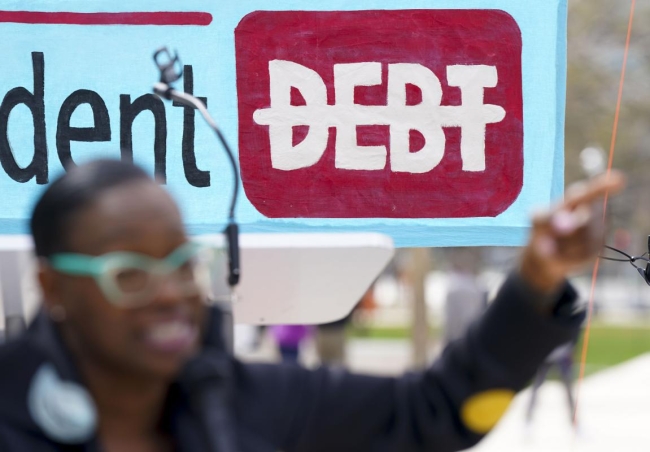You have /5 articles left.
Sign up for a free account or log in.

Advocates are urging the Biden administration to continue the pause on student loan repayments while the administration’s debt-relief plan moves through the courts.
Leigh Vogel/Getty Images for MoveOn & Debt Collective
Student debt relief advocates are ramping up calls for President Biden to extend the student loan payment pause, and news reports suggest that the White House is listening.
The Washington Post reported Tuesday that White House aides were considering an extension of the pause that’s been in place since March 2020; however, the discussions are preliminary and the White House declined to comment. The pause currently is slated to end Dec. 31 with payments resuming Jan. 1.
Advocates have been pressing to keep loan payments paused after a federal judge in Texas declared the debt relief unconstitutional and a federal appeals court issued a preliminary injunction. In fact, advocates have argued that payments shouldn’t resume until lawsuits challenging the debt relief plan are resolved.
“Until the administration can deliver on debt cancellation, it really cannot turn on payments,” said Persis Yu, deputy executive director and managing counsel for the Student Borrower Protection Center.
When Biden announced his plan for student loan forgiveness in August, he tied the move to ending the payment pause. In court filings, the administration has argued that vulnerable borrowers were likely to default on their student loans as a result of the pandemic, making the $10,000 or $20,000 of loan cancellation necessary so that individuals won’t be worse off.
“I think the administration was absolutely right in its reasoning that restarting repayment is going to have a devastating effect financially on borrowers,” Yu said. “Cancellation is necessary to buffer that negative effect. It would be absolutely devastating to the finances of student loan borrowers to just restart repayment in January.”
Yu added that the shifts in the economy during the pandemic, such as unemployment and inflation, have added to the financial burdens on student loan borrowers.
“The payment pause is popular and necessary,” she said. “I’m hopeful, because it’s the right thing to do. The administration knows what a hardship turning on payments will be for borrowers.”
At the start of the COVID-19 pandemic, former president Trump paused payments for student loans under the authority of the Higher Education Relief Opportunities for Students, or HEROES, Act of 2003, which the Biden administration says also gives Education Secretary Miguel Cardona the ability to relieve student debts for those affected by a national emergency. The debt-cancellation plan is the focus of several legal challenges, but not the payment pause, which Trump and then Biden have extended several times. Student loan balances also aren’t accruing interest during the pandemic.
The Consumer Financial Protection Bureau found in an April report that many borrowers would struggle to make payments when the pause ended.
That resumption of payments comes as the administration is overhauling debt-relief programs including income-driven repayment and Public Service Loan Forgiveness. New regulations aimed at fixing Public Service Loan Forgiveness are going into effect July 1. In July, the administration is planning to correct payments for eligible borrowers, which will wipe out student loans for thousands of people.
Cody Hounanian, executive director of the Student Debt Crisis Center, said the loan servicing company for more than 16 million borrowers has changed, which is a challenge for borrowers who are still trying to understand who their servicer is.
“To restart student loan payments with all of this disruption, without borrowers being put back into a system that’s stable and settled, to me, is just another obstacle that borrowers really experienced and understand more than anyone else,” he said.
Natalia Abrams, president of the Student Debt Crisis Center, said that the court decisions just put more pressure on the administration to extend the pause.
“We’ve always said that we should not return to repayment until the system is fixed,” she said.
After the Texas ruling last week, the Student Debt Crisis Center launched a petition calling for the administration to extend the pause for an indefinite period. Hounanian said more than 51,000 people have signed that petition.
“We feel that the president has communicated his desire to use debt cancellation to repair the harm caused by the COVID-19 pandemic, and without debt cancellation, these borrowers are still shouldering that burden,” Hounanian said.
About 83 percent of student loan borrowers who responded to a recent Student Debt Crisis Center survey said that they currently depend on the payment pause as pandemic relief, according to a news release. Two-thirds of respondents said they haven’t financially recovered from the pandemic. Borrowers reported in the survey that they are concerned about paying for food, rent and basic necessities if payments resume, and about half said they will not be able to afford their student loan payments in six months.
“We know from speaking with borrowers that this recent court decision has left them in such a limbo, and that’s why we are urging the president to come out yesterday to announce the payment pause,” Abrams said.
Since the court decisions, Hounanian said that he’s heard a lot of confusion from borrowers. The center is hosting a town hall this week to answer borrowers’ questions.
“Borrowers really aren’t sure what’s happening and where we stand,” he said. “There’s a great deal of confusion and a great deal of fear as well. Borrowers are really looking at Jan. 1 as a financial cliff. They don’t know how they’re going to be able to afford these payments on top of paying for food and affording rent.”




